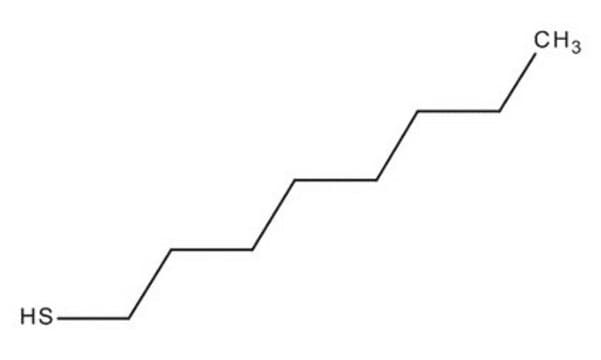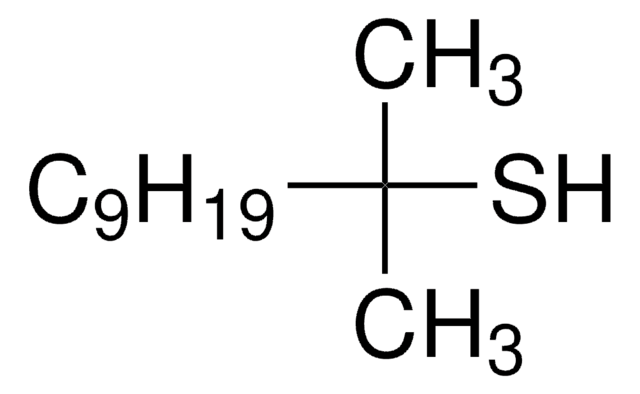8.20544
1-Dodecanethiol
for synthesis
Synonym(s):
1-Dodecanethiol, Lauryl mercaptan, Dodecyl mercaptan
About This Item
Recommended Products
vapor pressure
0.002 hPa ( 20 °C)
Quality Level
assay
≥98.0% (GC)
form
liquid
autoignition temp.
230 °C
potency
>2000 mg/kg LD50, oral (Rat)
mp
-9--7 °C
transition temp
flash point 127 °C
density
0.845 g/cm3 at 20 °C
storage temp.
2-30°C
SMILES string
SCCCCCCCCCCCC
InChI
1S/C12H26S/c1-2-3-4-5-6-7-8-9-10-11-12-13/h13H,2-12H2,1H3
InChI key
WNAHIZMDSQCWRP-UHFFFAOYSA-N
General description
Application
- A sulfur source and capping ligand in the synthesis of copper sulfide nanoparticles (Cu2S) which can be applied as electron donor and hole acceptor in photocatalytic reactions.
- A coordinating ligand to prepare Cu2ZnSnS4 (CZTS) nanocrystals to control the nucleation and growth of CZTS nanocrystals.
Zinc-doped copper indium sulfide (ZnCuInS2) quantum dots can be functionalized with 1-decanethiol as a ligand to improve the charge mobility and luminance of organic light emitting diodes (OLEDs).
Analysis Note
Density (d 20 °C/ 4 °C): 0.844 - 0.846
Identity (IR): passes test
signalword
Danger
hcodes
Hazard Classifications
Aquatic Acute 1 - Aquatic Chronic 1 - Eye Dam. 1 - Skin Corr. 1C - Skin Sens. 1A
Storage Class
8A - Combustible, corrosive hazardous materials
wgk_germany
WGK 3
flash_point_f
262.4 °F - closed cup
flash_point_c
128 °C - closed cup
Certificates of Analysis (COA)
Search for Certificates of Analysis (COA) by entering the products Lot/Batch Number. Lot and Batch Numbers can be found on a product’s label following the words ‘Lot’ or ‘Batch’.
Already Own This Product?
Find documentation for the products that you have recently purchased in the Document Library.
Customers Also Viewed
Our team of scientists has experience in all areas of research including Life Science, Material Science, Chemical Synthesis, Chromatography, Analytical and many others.
Contact Technical Service

















